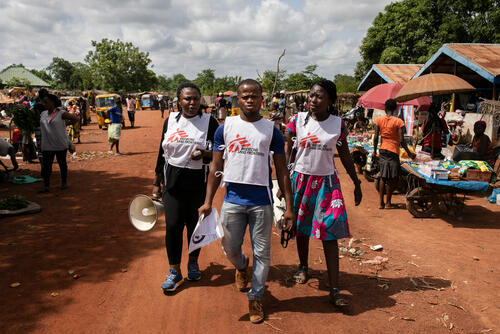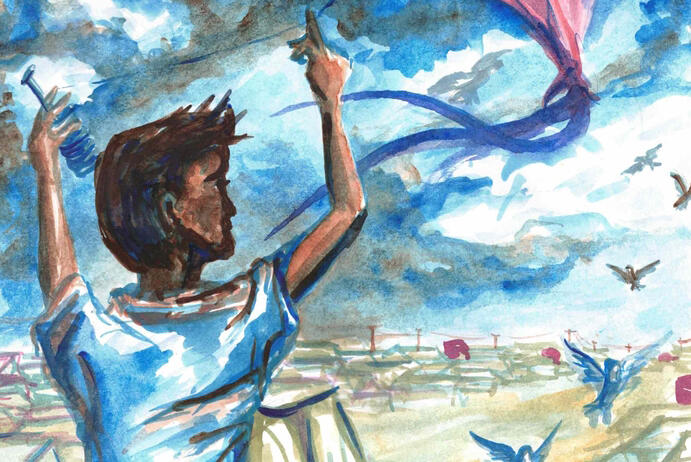Syria: New MSF report details danger and desperation in Al-Hol Camp
Two boys who both died while awaiting approval for emergency medical care are just two examples of many tragic cases featured in a new report on Al-Hol Camp in northeast Syria.
The report by Médecins Sans Frontières / Doctors Without Borders (MSF) details the cruelty in the camp and the long-term detainment of more than 50,000 people, the majority being children.
Now, their stories, and others, have been documented in Between two fires: danger and desperation in Syria’s Al-Hol camp.
Unconscious and alone
In February 2021, a seven-year-old boy was rushed to MSF’s clinic in Al-Hol with second-degree burns across his face and arms. Lifesaving medical care was no more than an hour's drive away, yet it took two days for his transfer to be approved by camp authorities.
He died on the way to the hospital under armed guard, separated from his mother, in agony.
Just a few months later, in May of the same year, a five-year-old boy was hit by a truck and rushed to the same small clinic. MSF staff recommended he be referred to the hospital for emergency surgery.
Despite the urgency, it took hours for his transfer to be approved. He died en route to the hospital, unconscious and alone.
These are just two of the 79 children who died in the Al-Hol detention camp last year. In 2021, 35 percent of those who died in the camp were children under the age of 16.
“We have seen and heard many tragic stories in Al-Hol detention camp in Syria, including children dying as a result of prolonged delays in accessing urgent medical care,” says Martine Flokstra, MSF Syria Operations Manager.
“Young boys [are] reportedly forcibly removed from their mothers once they reach around 11 years old, never to be seen again.
“For children and their caregivers in Al-Hol, if they can access medical care, it is often a terrifying ordeal. Children who require treatment at the main hospital about an hour's drive away from the camp are escorted under armed guard, and in most cases without their caregivers, as they are rarely given approval to go with their children.
“Al-Hol is effectively a massive outdoor prison, and the majority are children, many of who have been born there, robbed of their childhoods, and condemned to a life exposed to violence and exploitation, with no education, limited medical support and no hope in sight.”
In numbers: Al-Hol Camp
- In total, 64 percent of people detained in Al-Hol are children, while 50 percent of the population are under the age of 12. Boys entering their teenage years are reportedly separated from their mothers. There is no information on where they are taken or what happens to them next.
- In 2021, 35 percent of deaths in Al-Hol were children under 16 years. The leading cause of mortality was crime-related deaths, accounting for 85 deaths.
- Of the 53,000 people held in Al-Hol, around 11,000 are foreign nationals housed in a sectioned-off area known as ‘The Annex’.
- Around 60 countries have citizens in Al-Hol and other detention camps in Syria, including the UK, Australia, China, Spain, France, Switzerland, Tajikistan, Turkey, Sweden and Malaysia.
- Since October 2020, 1,300 Syrian families have been allowed to leave, however, waiting lists are long and the process is opaque. Around 3,000 Iraqis were repatriated in August 2022.
An open-air prison
The camp was once designed to provide safe, temporary accommodation and humanitarian services to civilians displaced by the conflict in Syria and Iraq.
However, the nature and purpose of Al-Hol has long deviated and grown increasingly into an unsafe and unsanitary open-air prison after people were moved there from Islamic State (IS) controlled territories in December 2018.
“Members of the Global Coalition against IS, as well as other countries whose nationals remain held in Al-Hol and other detention facilities and camps in Northeast Syria, have failed their citizens,” adds Martine Flokstra.
“They must take responsibility and identify alternative solutions for the people detained in the camp. Instead, they have delayed or simply refused to repatriate their citizens, in some cases going as far as to strip them of their citizenship, rendering them stateless.
“Despite the violent and unsafe conditions in Al-Hol, and more than three years after more than 50,000 people were moved there, insufficient progress is being made to close the camp.
“There are still no long-term alternatives to end this arbitrary and indefinite detention. The longer people are kept in Al-Hol, the worse it gets, leaving a new generation vulnerable to exploitation and without any prospect of a childhood free from violence.”

UK responsibility
Natalie Roberts, Executive Director of MSF UK said:
“As a member of the Global Coalition against IS, and a country whose citizens are held in detention facilities such as al Hol, the UK must step up and take responsibility.
“So far, it has failed to do so. Ministers have instead delayed or outright refused to repatriate the vast majority of British nationals, or in some cases have even stripped them of their citizenship, rendering them stateless.
“The longer people are held in al Hol, the worse the situation gets. The UK Government must change course and identify alternative solutions for people subjected to arbitrary, indefinite detention in the camps.”
MSF in Syria
War has raged in Syria for over a decade, killing hundreds of thousands of people, displacing millions more, and causing widespread destruction and suffering. Civilian areas have been routinely bombed and deprived of assistance, and access to healthcare remains extremely poor in many areas.
Médecins Sans Frontières/Doctors Without Borders (MSF) operates in Syria where it can, but ongoing insecurity and access constraints severely limit our activities and hamper our ability to provide humanitarian assistance that matches the scale of the needs.
